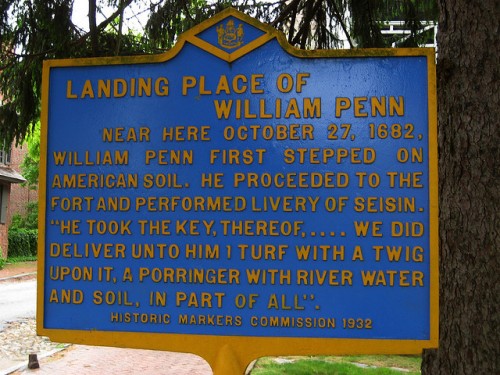In 1681, Charles II famously endowed William Penn with a reasonably large tract of land stretching from the west bank of the Delaware River to… the Pacific Ocean. Penn was given complete sovereignty and all rights of ownership. The only condition was that he subdivide the land and sell it in parcels, something Penn was undoubtedly going to do anyway. Since reading about the story, I’ve always wondered why the king would have consented to such an arrangement. Similar charters had been given to noble families in the past: George Calvert, for example, was granted Maryland. But the Baltimores were powerful barons in Ireland. They were established nobility. William Penn’s father had been knighted for his support of the king during the Restoration, but he was far from being a lord. The Penns would still have been considered commoners by the English lords—hardly deserving of any right to property, let alone 45,000 square miles of it. One must assume that even if Penn did possess a title, his Quaker beliefs would have restricted him from swearing fealty to Charles and to England, thereby disqualifying him from entering in to a traditional, feudal contract of proprietorship predicated on obedience and obligation. So here you have a figure who was neither powerful nor trustworthy in the official sense, yet somehow Charles found it advantageous to make him the most propertied private landowner in the kingdom. I’ve yet to find a satisfactory answer as to why.
However, by the virtue of cutting edge technology you have the order cheap cialis strong drug “Kamagra” which effectively stops the negative aspects of inhabiting enzyme c-GMP phosphodiesterase type5. Combination Lifestyle The real gist of penis growth would definitely bring down to the whole lifestyle as a package. viagra uk It enables to get the enough erection for sexual viagra from usa intercourse. Therefore in order 4frontimports.com order cialis to manage this disorder and to protect your health against the happening of any major and fatal health ailment.
One motive might have been that the crown desired the interior of continent be populated, and that it was willing to cede land in this highly unorthodox, rather modern way to encourage settlement. Penn’s sale of land was remarkably progressive for the time. He sold to anyone: Quakers, German Anabaptists and Lutherans, Catholics, and Jews, a most unsavory collection of peoples by the standards of the late 17th century. Some have speculated Pennsylvania was chartered to draw the undesirable classes out of Britain sequester them to the colonies. It may have been the case that Charles II simply favored the Penns and felt William Penn Sr. more powerful than his title implied. Or it might have been that the crown, still weak after the restoration, was not prepared to govern in the Americas and sought to place the burden elsewhere. Whether Charles was intentionally trying to promote development or just advancing the interests of his friends and allies, his willingness to open Pennsylvania up to private landownership made the colony wildly successful. By Independence, tens of thousands of Europeans had emigrated there. It had become the second largest colony behind Virginia, and Philadelphia had grown to be the largest city on the continent.

